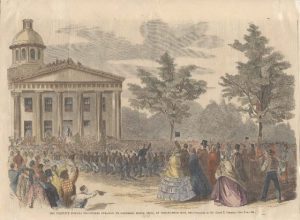AND THIS EVENT
What are the words you hear in your head when you approach the challenge of major change?
The words in your head are the silent message that you hear over and over. Maybe you share them with someone else. Maybe you don’t. Doesn’t matter—the point is that you hear an echo of a previous experience, a powerful moment, an unforgettable story. Quite likely it’s something you’ve lived yourself. On occasion, though, it may be something you’ve seen or heard indirectly and for whatever reason, it’s stuck with you through thick and thin.
Again, the point is that there are words in your head which you use when you confront a major change in your work, your career, your calling, your life.
And now, I’d like to warn you about those words.
“Remember Buena Vista.”
On a beautiful spring day in 1861 a crowd gathered in a northern American city (that’s the image above). They were there to celebrate the decision of a group of men. Each of the men had decided to volunteer for the American Army. Their decisions came a few weeks after rebellious citizens in Charleston, South Carolina had fired upon and seized control of an American military post, Fort Sumter. These men in the northern city had enlisted in the US military in order to put down a growing rebellion.
An atmosphere of thrill and excitement surrounded the crowd in this northern city. Smiles, laughs, hugs, kisses, handshakes, pats on the back, fists raised in the air, and more, all of them mingled together on the marvelous spring day. Very Important People—the politicians, the business owners, the ministers, the media, and others—spoke words of praise and congratulations, promise and predictions. The men who had volunteered stood and basked in the attention.
Then, someone in the crowd, shouted a chant, a slogan in cadence. Everyone, whether Very Important People or just the day-to-day people, joined in. The words echoed loudly across and over and among the crowd.
“Remember Buena Vista! Remember Buena Vista! Remember Buena Vista!”
Those are the words they had in their head.
In 2017, we know that this crowd was on the verge of one of the most horrific (and pivotal) wars in the American experience, in world history. Nothing like it had ever been experienced in the American nation. At a cost of nearly 700,000 lives and millions upon millions of dollars of destruction, the war changed so very much about what it meant—for blacks and whites—to be an American.
Yet here they were, on this gorgeous day in 1861, chanting a three-word slogan pulled from one battle in a war fifteen years earlier. They thought that previous experience was helpful in knowing what to do next, what to expect. They were wrong.
They were doing then what many of us do now—trying to light the path toward the future with something familiar from the past.
I’m a consulting leadership historian and I help people use the past and history to improve their leadership. I love the past. I love history. But part of the value of both is to remind us that a moment will come when, as Abraham Lincoln said, “The dogmas of the quiet past, are inadequate to the stormy present. The occasion is piled high with difficulty, and we must rise — with the occasion. As our case is new, so we must think anew, and act anew. We must disenthrall ourselves, and then we shall save our country.“
When to listen to the words in your head, when to set them aside, what to do with the words in your head, this is a challenge of leadership when you confront major change.
Remember Buena Vista.








